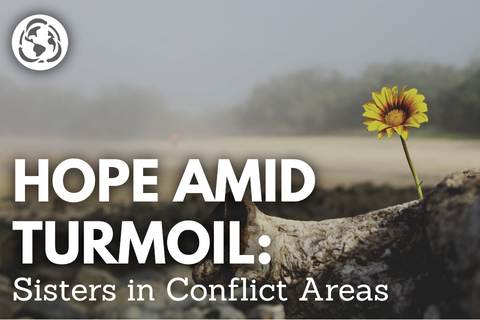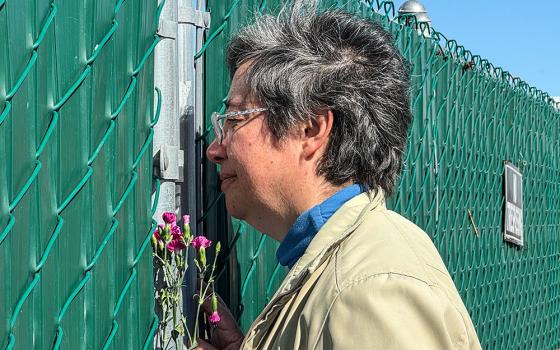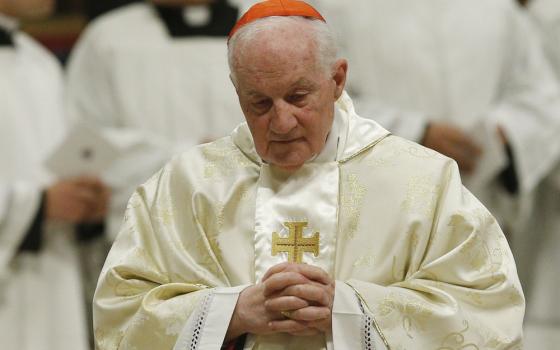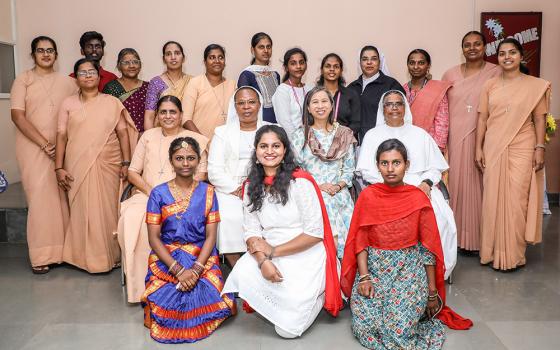Patience Iremiah, 9, receives the first of three HPV vaccine doses in the New Kuchingoro IDP Camp in Abuja, Nigeria, on March 25. The vaccine protects against infections and cervical precancers. (GSR photo/Valentine Benjamin)
Editor's note: Today, Global Sisters Report continues our series, Hope Amid Turmoil: Sisters in Conflict Areas, which offers a look at the lives and ministries of women religious serving in dangerous places worldwide. The news stories, columns and Q&As in this series will include sisters in Ukraine, Nigeria, Kenya, Sri Lanka, Nicaragua and more throughout 2023.

While living in a camp for internally displaced persons, or IDPs, in Nigeria, Joseph James often experienced depression, anxiety, anger, flashbacks and nightmares. Memories of Boko Haram haunted him, particularly the foot soldiers who in 2014 raided his hometown of Gwoza, Nigeria, along the hilly frontier with Cameroon.
"I had to start smoking inside the camp because I felt I needed it to forget the memories of the attack," the 23-year-old told Global Sisters Report from New Kuchingoro IDP Camp in Abuja, Nigeria's capital city.
"The terrorists marched into my village of Gwoza, shooting sporadically and killing a lot of people," he said, recalling the May 2014 attack. "They ripped my maternal uncle's stomach open; I saw him lying helplessly in a pool of blood on the sandy soil on our compound, while my younger brother and I fled into Cameroon due to its proximity to our village."
James told Global Sisters Report that many people who ran with him in an attempt to escape the attack were shot dead. But that deadly night was just one of many: Since 2009, Boko Haram, the Islamic State in West Africa and other armed extremist groups have killed more than 35,000 people in northern Nigeria in attempts to establish an Islamic state, according to the Global Centre for the Responsibility to Protect.
Weeks after fleeing for Cameroon, James returned to Nigeria, settling into the New Kuchingoro IDP Camp where the Medical Missionaries of Mary attend him and thousands of others.
James is just one of millions of Nigerians taking shelter in camps for IDPs across the country, as Boko Haram and other non-state armed groups have forced more than 3 million people to flee their homes in the northeast region of the country, according to the United Nations Refugee Agency.
But a committed and active network of Catholic sisters from the Medical Missionaries of Mary are working to provide rehabilitation for young citizens addicted to drug abuse, as well as shelter for IDPs who fled their homes, regrouped, and now live in tents and shoddy housing in New Kuchingoro IDP Camp. In Kuchingoro — which the Nigerian government established in 2014 — anxiety and drug abuse have flourished, with young residents quietly resorting to drugs as a coping mechanism. According to the World Health Organization, IDPs are among the most at risk for psychiatric disorders, such as depression, anxiety and post-traumatic stress.
Sr. Dumka Michael (center), administrator and project officer for the program that the Medical Missionaries of Mary run at the New Kuchingoro IDP camp in Abuja, Nigeria, sits for a group photo March 25. (GSR photo/Valentine Benjamin)
At the camp, James received psychosocial counseling and psychotherapy from the sisters, which helped him recover from his trauma and drug addiction.
Without judgment, the nuns visit young people in the IDP camp who, like James, have turned to drugs to cope with the effects of trauma. Dressed casually without their veils to help the youth feel free to share their concerns with them, the sisters offer psychosocial counseling, which addresses people's physical, emotional, social and mental well-being. The aim is to help them overcome environmental, emotional and social problems that are affecting their mental health.
Sr. Bernadette Unamah, a psychosocial counselor and one of the three Medical Missionaries of Mary helping the IDPs rebuild their lives, said forced evictions create psychological, social and spiritual harm.
Bilikisu Luka experienced night terrors — episodes of screaming, intense fear and flailing while asleep — as a result of the killings she witnessed in her home state of Borno, Nigeria.. (GSR photo/Valentine Benjamin)
Bilikisu Luka, 24, had just finished writing her elementary school final examination in July 2011, when she heard gunshots and shrieks outside her classroom along Damboa Road in the Nigerian state of Borno.
"I saw people lying dead on the bare ground outside the school when my dad rushed down to take me home after the shooting," said Luka, who was 12 at the time. "It was the first time I saw dead bodies. So, I asked my dad if that was how I would be shot and killed, but his response made me cringe in fear."
"He told me that it was not their choice to die, which made my heart race faster as we sneaked home."
Luka experienced night terrors: screaming, intense fear and flailing while asleep. "I could not sleep because I saw them anytime I closed my eyes. I was always screaming and shouting at night," said Luka, who lives in the New Kuchingoro IDP camp. She is studying mass communication at the National Open University of Nigeria.
Makeshift homes where the IDPs live in the New Kuchingoro IDP Camp on the edges of Abuja, Nigeria (GSR photo/Valentine Benjamin)
Like James, Luka benefited from the sisters' psychological program. The sisters help them deal with these challenges by talking and listening to them through counseling to see how they can offer them holistic healing.
"We also test them for different sicknesses, and if we have any positive cases, we refer them to the hospital for care, and we have continued talking to them," Unamah said, adding that they are on the lookout for diseases like HIV/AIDS, STDs, hepatitis, typhoid and malaria.
The sisters are also working with 40 people on rehabilitation and social reintegration.
Sr. Dumka Michael, administrator and project officer, and Sr. Theresa Agbam, health officer, work with Unamah. The trio visits the IDP camp three times a week to help people with medical and relief items, and to provide counseling to rebuild their resilience.
The nuns also offer workshops to enroll the victims in different programs that teach them artisanal skills, such as welding and fabrication, carpentry, and shoemaking. Michael said funds are readily available for only six beneficiaries to enroll, while others pursue different training opportunities.
At the end of the workshop, participants (individuals or families) receive the equivalent of roughly $400 over three months for their daily living costs. The nuns also support them with a stipend to start small businesses, including funds for one-year accommodation in any location of their choice before relocation commences. So far, they have relocated 49 families.
The nuns, in partnership with Misean Cara, a Dublin-based nonprofit supporting missionaries' efforts to eradicate poverty and inequality, provided free HPV, or human papillomavirus, vaccinations to girls ages 9-10. The goal, Michael said, was to get them vaccinated before they start engaging in sexual activities. The HPV vaccine protects against infections and cervical precancers. It requires three doses.
"The church always needs to help the poor because they are part of creation and are no lesser humans," Michael said. "Being poor does not make you a lesser creation of God; it is only a situation, and something that passes. When they receive help, they become better."
Advertisement
In addition to Misean Cara's sponsorship, the sisters also generate some funding within their congregation, though they remain underfunded.
But despite financial constraints, Michael considers it important to empower indigent Nigerian citizens and prevent criminality and insecurity.
"The biggest challenge is getting people that will buy into our ideas and understand that it is not just about giving food items, and then they go home and remain the same," she said. "We want to be able to help families by feeding them, sheltering them and providing them with sources of livelihood.
"On the other hand, you are giving them a sense of belonging that they are no lesser humans."








